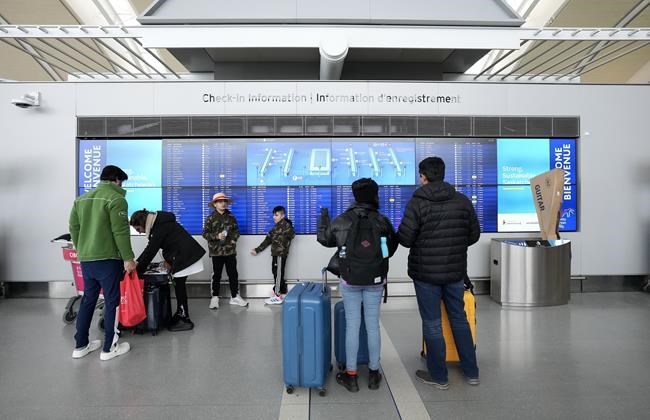OTTAWA — The Supreme Court of Canada agreed on Thursday to hear an appeal from a group of airlines looking to quash rules that boost compensation to passengers for delayed flights or damaged luggage.
Air Canada, Porter Airlines Inc. and 16 other appellants argue that Canada's four-year-old passenger rights charter violates global standards and should be rendered invalid for international flights.
The legal action that started in 2019 states that by imposing heftier compensation requirements for flight cancellations or lost baggage, the regulations exceed the Canadian Transportation Agency’s authority and contravene internationally agreed upon rules known as the Montreal Convention.
In December, the Federal Court of Appeal dismissed the airlines' case, with the exception of one regulation that applies to the temporary loss of baggage.
The Canadian Transportation Agency and attorney general argue there is no conflict between passenger protections and the Montreal Convention, a multilateral treaty.
Under the federal rules, passengers must be compensated with up to $2,400 if they were denied boarding because a trip was overbooked — so-called flight bumping. Delays and other payments for cancelled flights warrant compensation of up to $1,000. Travelers can receive up to about $2,350 for lost or damage baggage, though the exact number fluctuates based on exchange rates.
Air passenger rights advocate Gabor Lukacs, who was an intervener in the case at the Federal Court of Appeal, said the government could undercut the airlines' case by passing legislation that states the regulations are applicable and payable, regardless of the provisions of the Montreal Convention.
The government hasn't taken that step, but does continue to adjust the rules that first came into force in 2019. Earlier this year, it amended the laws to close some loopholes on when airlines wouldn't have to pay compensation, while also establishing a more streamlined complaints resolution system tin a bid to reduce a backlog of more than 50,000.
For now though, Lukacs said he's still not seeing enough pressure from the government to implement the law.
"There's still no meaningful enforcement happening and that's part and parcel of the problem."
He said he's worried airlines might use the continuation of the case to the Supreme Court as an excuse to delay or not pay compensation.
"I would have been much happier if it would have been denied, because it would have put an end to this saga."
The International Air Transport Association, the lead party in the appeal, said it had no comment on the appeal as the proceedings are before the court.
Porter Airlines spokesman Brad Cicero said in a statement that while the airline agrees with broad objectives of the regulations, it is supporting other parties in the court application to clarify aspects that may be inconsistent with established treaty obligations for international travel.
Air Canada didn't immediately respond to a request for comment.
The Supreme Court looks at upwards of 600 applications for leave to appeal each year and grants about 80 of them.
This report by The Canadian Press was first published Aug. 17, 2023.
Companies in this story: (TSX:AC)
The Canadian Press



